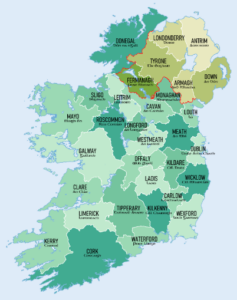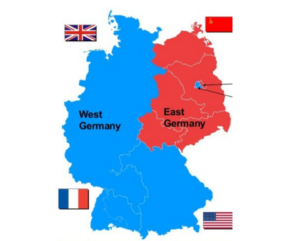The unification of North and South in the Republic of Ireland has long been a contentious issue, and Brexit has caused a resurgence of interest in the topic in the North. Historical examples of unification have shown that the process can be challenging, creating new divides in the process of bridging old ones. The 1990 reunification of Germany, for instance, has caused economic and social issues which continue to shape life in Germany today. Analysts project similar problems in a unified Ireland, encouraging politicians and citizens alike to question to peace-building potential of unification.

Unification is often seen as the ultimate solution in achieving peace in divided post-conflict societies. In the case of Ireland specifically, interviews like that conducted by Garry, Gillespie and O’Leary for the Irish Times in 2021 show that there is a strong desire for the unification of Ireland, at least in the Republic of Ireland.[i] Alongside support in the Republic, the negotiations around and impacts of Brexit have increased calls for unification in Northern Ireland.[ii] While unification may provide solutions to complex post-Brexit issues on the island of Ireland, the unification of Germany demonstrates that unification can be a bumpy process which doesn’t necessarily lead to a greater sense of national peace. In this entry, I will examine the long-lasting consequences of reunification in Germany. I will then outline some of the potential barriers to unification in Ireland, in an effort to promote critical reflection on the concept of unification as a peacebuilding measure.
German Unification
As is well known, Germany was divided between the four Allied powers in the aftermath of the second world war, creating the American, British and French controlled Federal Republic in the West and the Soviet-governed Democratic Republic in the East. Its re-unification, following the fall of the Berlin Wall in 1989, has been hailed as a great peace-building success story, but there were many challenges to navigate.

For instance, while a capitalist economy had flourished in the West, communism reigned in the East, and all large businesses and the majority of small businesses were state-owned. Due to this, the pre-unification currency union, introduced to prepare East and West for unification, caused labour costs in the East to sky-rocket, resulting in mass unemployment. These high levels of unemployment continued to rise in the years following unification in 1990, as Western Industries bought up the previously state-owned Eastern businesses. Two-and-a-half million of the new Treuhandanstalt workers’ union’s four million workers were let go, and 80% of the previously state-run Eastern firms were sold to West German business owners. The effects of wide-spread Eastern unemployment are still felt in Germany today, more than thirty years after unification. The GDP per-capita in what was once East Germany is still 30% lower than that in the former West. Likewise, wages in the East are an average of 17% lower than in the West. Economics are often cited as a factor in maintaining peaceful societies, and the economic inequalities in Germany have also had political ramifications.[iii] While 70% of East Germans support unification, dissatisfaction over the economic situation in the East has given the far left and right of the political spectrum a foothold, spurred on by a rhetoric of economic disadvantage.
Learning from History
Projections of the costs and impacts of unification on the island of Ireland share many of Germany’s problems. The GDP per-capita in Northern Ireland is lower than that of the Republic of Ireland, and analysts question the Republic of Ireland’s ability to support Northern Ireland, as the region requires approximately £9 billion of investment from Westminster each year.[iv] From the perspective of citizens of Northern Ireland too, unification might not seem economically beneficial. While citizens of Northern Ireland are at present able to access the NHS public healthcare system, the healthcare system in the Republic of Ireland is a complicated public-private system, with no NHS access.
Aside from economic concerns, any move towards unification risks inciting loyalist paramilitary violence. Even if unification were to be achieved in such circumstances, a loyalist enclave would likely remain in the north-east of the country, constituting a substantial security risk. Furthermore, the steady emergence of Northern Irish identity, separate from a British or Irish identity has the possibility of neutralising influence of the growing Catholic Irish population, as Northern Ireland continues to embraces its status as a statelet.[v] The Good Friday (or Belfast) Agreement states that a referendum must be called if there is an indication of a majority desire for unification in Northern Ireland. However, this simple-majority approach also leads to concerns over a peaceful approach to unification. Due to the possibility of creating an enclave, it has been suggested that the Good Friday Agreement be amended to call for a ‘supermajority’ of 60% in a referendum before unification can be approached.
It is clear that although there is a growing desire for unification on the island of Ireland, it may create many new problems to be solved. The tumultuous economic, social and political effects of unification should not be overlooked. East and West Germany never experienced sectarian violence on the Northern-Irish scale and the unification process was relatively amicable. However, the German case-study demonstrates that unification can inonetheless result in long-lasting divisions and inequalities, something which citizens and politicians in Northern Ireland and the Republic alike would certainly prefer to avoid. Andy Pollak, the former director of the Centre for Cross Border Studies in Ireland sums up the potential dangers of unification in Ireland by a simple majority vote saying, ‘If it [unification] happens that way, it’s going to be messy and angry’.
What do you think?
- When you visualise peace, do you think about ideas of unity and unification?
- How would you define the term ‘unification’? Is unification always voluntary?
- Can you think of any other examples of unification in history? Was the process of unification peaceful? Can you think of any long-term effects which this unification has had, negative or positive?
- Is there a difference between ‘unification’ and ‘reunification’?
If you enjoyed this item in our museum…
You might also enjoy Twenty-Five years of the Good Friday Agreement, Cambridge Union Debate: Where Does Northern Ireland Belong?, Fractured Peace: a visual representation, Get Your Brits Out, The Wolfe Tones and ‘Get Your Brtis Out‘.
Aimée Capraro, April 2023
References
[i] Garry, John, Paul Gillespie and Brendan O’Leary, “What people in the Republic actually think about Irish unification: Preference for a five-to-10-year timeframe for a vote on a clear model for unity,” The Irish Times, September 23, 2021, https://www.irishtimes.com/opinion/what-people-in-the-republic-actually-think-about-irish-unification-1.4681111.
[ii] Ed O’Loughlin, “The ‘Messy and Angry’ Prospect of Ireland Reunifying,” The Atlantic, October 21, 2019, https://www.theatlantic.com/international/archive/2019/10/ireland-britain-brexit-reunification/600328
[iii] Sean Byre and Neal Carter, “Social Cubism: Six Social Forces of Ethno-territorial Conflict in Northern Ireland and Quebec,” Journal of Peace and Conflict Studies 3, no. 2 (1996): 52-7: “Social Cubism: Six Social Forces of Ethnoterritorial Politics in North” by Sean Byrne and Neal Carter (nova.edu)
[iv] See above, n. [i], O’Loughlin, “The ‘Messy and Angry’ Prospect of Ireland Reunifying”.
[v] Ibid.
Andy Pollak quoted in, ibid.